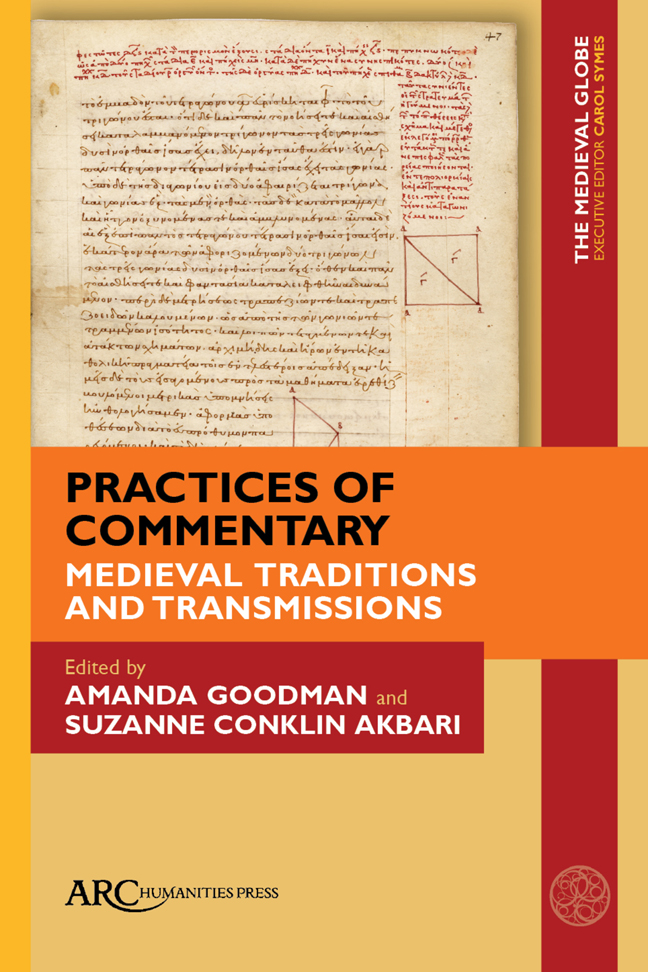Book contents
- Frontmatter
- Contents
- List of Illustrations
- Introduction: Commentary at the Crossroads
- Graeco-Roman Commentary Beyond Alexandria: Problems and Prospects
- From Plane to Space: The Narrative Arc of a Byzantine Mathematical Manual
- Periodization in the Sunni Qur'an Commentary Tradition: A Chronological History of a Genre
- On the Practice of Autocommentary in Sanskrit Sources
- Oral Commentaries and Scholarly Debates in Sanskrit Philosophy
- On the Nature of Chinese Buddhist Scriptural Exegesis: Observations on the Commentaries of Chengguan, Woncheuk, and Other Sui-Tang Exegetes
- The Mise-En-Page of a Sino-Tibetan Dunhuang Manuscript: Yuanhui's Commentary on the Laṅkāvatārasūtra
- Commentary and Multilingualism in the Ottoman Reception of Texts: Three Perspectives
- Index
Introduction: Commentary at the Crossroads
Published online by Cambridge University Press: 17 February 2024
- Frontmatter
- Contents
- List of Illustrations
- Introduction: Commentary at the Crossroads
- Graeco-Roman Commentary Beyond Alexandria: Problems and Prospects
- From Plane to Space: The Narrative Arc of a Byzantine Mathematical Manual
- Periodization in the Sunni Qur'an Commentary Tradition: A Chronological History of a Genre
- On the Practice of Autocommentary in Sanskrit Sources
- Oral Commentaries and Scholarly Debates in Sanskrit Philosophy
- On the Nature of Chinese Buddhist Scriptural Exegesis: Observations on the Commentaries of Chengguan, Woncheuk, and Other Sui-Tang Exegetes
- The Mise-En-Page of a Sino-Tibetan Dunhuang Manuscript: Yuanhui's Commentary on the Laṅkāvatārasūtra
- Commentary and Multilingualism in the Ottoman Reception of Texts: Three Perspectives
- Index
Summary
THE GLOBAL TURN in Medieval Studies requires something different from every historical subfield—be it literary, art, social, or intellectual history. While certain meth-odologies lend themselves to a global perspective, those that are linguistically intricate are more difficult. How, for example, can we enable conversations across disciplines, language groups, and cultural formations that are distantly related? Commentary—the interpretive tradition centred on transmitted texts—offers us a way in: the visual lay-out of the manuscript page reveals assumptions about the relative status of text and gloss; interpretive prompts in the marginal or interlinear commentary tell us about the relationship of teacher and student. Beyond these, material evidence of use—whether lecture notes scrawled hastily in the margin, or vivid rubrication to highlight key points to be memorized—illuminates the practices of commentary found within premodern scholarly communities. By exploring the development of these practices in a range of specific local contexts, it becomes possible to get a better sense of the wider patterns in use. While the centre of gravity in this special issue is medieval commentary, the indi-vidual contributions reach backward into antiquity and forward into the early modern period in order to highlight the continuities and disjunctions that can be observed when we take a long view of—and a geographically capacious perspective on—commentary.
One of the most exciting aspects of a global approach to intellectual history is that it demands a collaborative approach among scholars working on different traditions and within different conversations. No one scholar—or even research team—is capable of writing a truly synthetic global history of commentary. What we have aimed to do in this issue instead is to draw on a variety of specialists to depict the rich history of exe-getical practices as they appear from various angles. What does global history look like, for example, from the perspective of the commentary tradition on Sanskrit texts? What standard elements of the Qur’an commentary tradition are specific to Islamic cultures, and which are common to scriptural commentaries across confessional boundaries? Does the seemingly paradigmatic nature of the commentary traditions of Alexandria look quite so foundational when viewed from East Asia?
- Type
- Chapter
- Information
- Practices of CommentaryMedieval Traditions and Transmissions, pp. 1 - 8Publisher: Amsterdam University PressPrint publication year: 2023



